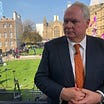We were at a summer party thrown by the editor of The Times to celebrate the knighthood just awarded in 2004 to one of his illustrious predecessors: Harry Evans. Tessa Jowell, a formidable builder of alliances herself, was impressed by the guest of honour.
Sir Harold was then into his late seventies and had lived in America for twenty years. He positioned himself on the upper level in the north London garden. “Do you see what he’s doing?” Tessa observed. First the step made up for his shortness of stature. Then as each arrival went up with their congratulations “Hello, what are you doing now?”, he asked. They had no alternative but to fill him in. “I’m Tessa Jowell, Secretary of State for Culture.” To which he had an ingratiating reply “Of course I know that Tessa, I meant what are you really up to?”
This social vignette was a classic journalistic craft. Sir Harold elicited the information he needed and left his interlocutor honoured to be telling him. Speaking softly in his northern accent he took charge of every encounter.
Harry Evans, who died this week aged 92, is being hailed as the greatest newspaper editor of his generation. Like the late Sir Terence Conran who also died recently, he was a leading member of that creative post-war generation which broke through British class barriers to transform the way we live and look now.
Before The Sunday Times, which Evans edited from 1967 to 1981, there were no multi-section newspapers covering everything from investigate journalism to consumer products, travel and sport – all strikingly laid out on the page. Evans made impact, layout and the use of pictures as vital to his paper as the writing, one area where he scored over the other titanic editor of his era, Ben Bradlee of The Washington Post.
Evans remarked that his grandfather would have been unable to read the newspaper he now edited. He benefited from the period of social mobility after 1945. He failed his 11 plus but still managed through apprenticeships to get to Durham University and then the editorship of The Northern Echo.
There he pioneered investigative journalism exposing the industrial pollution causing “the Teeside Smell” and beginning a campaign which led to cervical smears for women. Aged just 38 he was recruited to edit the Sunday Times.
There he set up the Insight team and gave them the resources for in depth exposes including Bloody Sunday, the Paris Airshow, the financial fraudster Bernie Cornfeld, the traitor Kim Philby and, most famously, the birth defect-causing drug Thalidomide. Insight spun off best-selling books including An American Melodrama, a shocking chronicle of the bloody 1968 US Presidential campaign.
Evans could be thin skinned, telling one Oxbridge-educated Insight editor “I never thought I’d hire a public schoolboy like you.” But he did. As editor he was a formidable spotter and assembler of talent. The Sunday Times Colour Magazine pre-dated him but he built it up with photographers such as Don McCullin and Tony Snowdon and educational part works serialised over weeks. His stable of writers ranged from the flirtatious Jilly Cooper to Nicholas Tomalin, the playwright Dennis Potter and the sportswriter Brian Glanville. The Sunday Times’ merciless cartoonist Gerald Scarfe became a national institution. Some of Harry’s team came across from the leftish Observer, less well-resourced but still able to give the Sunday Times strong competition in the 1960s and 70s.
Harry’s editorship of The Sunday Times effectively ended when disputes with the print unions led to a year-long shut down. Evans, apolitical but sceptical of all politicians, was never likely to get on with Rupert Murdoch, the new proprietor. After a contentious couple of years editing The Times, he left and emigrated to America.
By then he had a new wife, Tina Brown, who went on to relaunch both Vanity Fair and The New Yorker. Harry and Tina became a trans-Atlantic power couple. It was a love match and, as a magazine editor, she shared many of her husband’s talents: ferocious curiosity, an eye for a story and how to make it hit home, and talent spotting.
In his various new careers as a publisher, editor and author Harry metamorphosed into the grand old man of British journalism without ever quite joining the establishment. He continued to spot talent. In the US he brought out Fatherland, Robert Harris’s first novel, and published the Clinton roman a clef Primary Colours by “Anonymous”. From New York he produced memoirs, manuals of journalism and popular histories of his new nation, the United States, of which he took citizenship.
A generous and insightful mentor to so many, Harry embodied what journalism should be about – always built on “the bloody facts” but broadminded and far ranging as well. The last time I saw him was at another reception. Uninterested and unimpressed by the celebrity guests and champagne, he sat at a table beckoning over those he knew to fix them with his penetrating eyes and demand “what’s really going on?”










